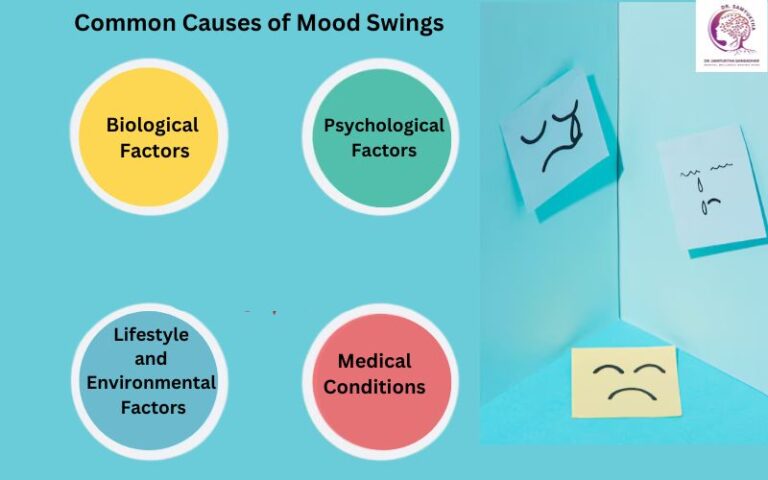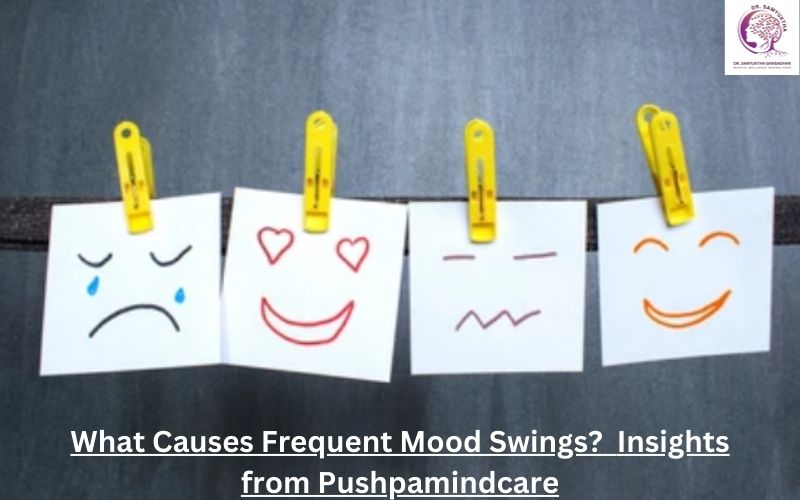Introduction
Mood swings, characterized by rapid and often extreme changes in mood, can significantly impact a person’s daily life. Understanding the underlying causes of these mood fluctuations is essential for effective management and treatment. In this comprehensive guide, we will explore the various factors that contribute to frequent mood swings, backed by research and expert insights from Dr. Samyuktha Gangadhar, M.D. (Psychiatry) at Pushpa Mindcare.
Understanding Mood Swings
Mood swings refer to the oscillation between different emotional states, such as happiness, sadness, anger, and irritability, within a short period. These changes can be distressing and confusing, affecting relationships, work, and overall well-being. While occasional mood swings are normal, frequent and severe mood changes may indicate an underlying issue.
Common Causes of Mood Swings

Biological Factors
- Hormonal Imbalances: Hormones play a crucial role in regulating mood. Fluctuations in hormone levels, particularly estrogen and progesterone, can lead to mood swings. This is commonly observed in women during menstruation, pregnancy, and menopause. According to a study published in the journal Psychoneuroendocrinology, changes in estrogen levels significantly impact mood and emotional regulation.
- Neurotransmitter Dysfunction: Neurotransmitters such as serotonin, dopamine, and norepinephrine are chemicals in the brain that influence mood. Imbalances in these neurotransmitters can contribute to mood disorders, including mood swings. Research from the National Institute of Mental Health indicates that serotonin imbalances are linked to mood disorders like depression and anxiety.
- Genetic Predisposition: A family history of mood disorders can increase the likelihood of experiencing mood swings. Genetic factors can influence the brain’s chemistry and response to stress. A study in Molecular Psychiatry highlights the heritability of mood disorders, suggesting that genetic factors account for about 40% of the risk for depression.
Psychological Factors
- Stress and Anxiety: Chronic stress and anxiety can lead to emotional instability. The body’s response to stress involves the release of cortisol, a hormone that can affect mood regulation. The American Psychological Association notes that high cortisol levels can impair cognitive function and increase vulnerability to mood disorders.
- Trauma and Abuse: Past traumatic experiences, including physical, emotional, or sexual abuse, can have long-lasting effects on mental health, leading to mood swings. Research published in the Journal of Traumatic Stress shows that trauma can alter brain structure and function, impacting emotional regulation.
- Personality Disorders: Conditions such as borderline personality disorder (BPD) are characterized by intense and frequent mood swings. Individuals with BPD may experience rapid shifts in emotions, often triggered by interpersonal conflicts. The National Alliance on Mental Illness (NAMI) states that BPD affects 1.6% of the U.S. population, highlighting the prevalence of mood instability.
Lifestyle and Environmental Factors
- Sleep Deprivation: Lack of adequate sleep can disrupt the brain’s ability to regulate mood. Sleep disturbances are closely linked to mood disorders such as depression and bipolar disorder. According to the Sleep Foundation, individuals with insomnia are ten times more likely to develop depression.
- Substance Abuse: The use of alcohol, drugs, and certain medications can affect brain chemistry and lead to mood swings. Substance withdrawal can also cause emotional instability. The National Institute on Drug Abuse (NIDA) reports that substance abuse can significantly alter mood and behavior, exacerbating mental health issues.
- Diet and Nutrition: Poor diet and nutritional deficiencies can impact mental health. For example, deficiencies in omega-3 fatty acids, vitamin D, and B vitamins are associated with mood disorders. A study in Nutrients journal suggests that omega-3 supplementation can improve mood and reduce the risk of depression.
Medical Conditions
- Thyroid Disorders: The thyroid gland produces hormones that regulate metabolism. Hypothyroidism (underactive thyroid) and hyperthyroidism (overactive thyroid) can cause mood swings and emotional disturbances. The American Thyroid Association highlights the importance of thyroid function in mood regulation, noting that thyroid imbalances can mimic depression and anxiety symptoms.
- Neurological Disorders: Conditions such as epilepsy, multiple sclerosis, and Parkinson’s disease can affect brain function and lead to mood changes. The National Institute of Neurological Disorders and Stroke (NINDS) emphasizes the emotional challenges faced by individuals with neurological conditions.
- Chronic Illnesses: Living with chronic illnesses such as diabetes, heart disease, and cancer can be emotionally challenging, contributing to mood swings. The Centers for Disease Control and Prevention (CDC) notes that managing chronic illness requires attention to both physical and mental health.
Diagnosing Mood Swings
Accurate diagnosis is essential for effective treatment. A comprehensive evaluation by a mental health professional, such as Dr. Samyuktha Gangadhar, involves:
- Medical History: Reviewing the patient’s medical, psychiatric, and family history to identify potential contributing factors.
- Physical Examination: Conducting a thorough physical examination to rule out medical conditions.
- Psychiatric Assessment: Assessing the patient’s mental health through interviews and standardized questionnaires.
- Laboratory Tests: Performing blood tests to check for hormonal imbalances, nutritional deficiencies, and other medical conditions.
Treatment and Management

- Medication: Depending on the underlying cause, medications such as antidepressants, mood stabilizers, and antipsychotics may be prescribed to manage mood swings. A study in The Lancet Psychiatry found that mood stabilizers like lithium can significantly reduce swings in individuals with bipolar disorder.
- Therapy: Psychotherapy, including cognitive-behavioral therapy (CBT) and dialectical behavior therapy (DBT), can help individuals develop coping strategies and improve emotional regulation. According to the American Psychological Association, CBT is effective in treating mood disorders by addressing negative thought patterns.
- Lifestyle Changes: Adopting a healthy lifestyle can significantly reduce mood swings. This includes regular exercise, a balanced diet, adequate sleep, and stress management techniques. Research from Harvard Medical School highlights the mental health benefits of regular physical activity.
- Support Systems: Building a strong support network of family, friends, and mental health professionals can provide emotional support and encouragement. The Mayo Clinic emphasizes the importance of social support in managing mental health conditions.
Coping Strategies
- Mindfulness and Meditation: Practicing mindfulness and meditation can help individuals stay grounded and reduce emotional reactivity. A study in JAMA Internal Medicine found that mindfulness meditation can reduce symptoms of anxiety and depression.
- Journaling: Keeping a journal to track mood patterns and triggers can provide valuable insights and aid in developing coping strategies. The University of Rochester Medical Center suggests that journaling can enhance self-awareness and emotional regulation.
- Relaxation Techniques: Techniques such as deep breathing, progressive muscle relaxation, and yoga can help manage stress and promote emotional stability. Research published in Frontiers in Psychology indicates that yoga can improve mood and reduce symptoms of anxiety and depression.
Expert Insights: Dr. Samyuktha Gangadhar
Dr. Samyuktha Gangadhar emphasizes the importance of a holistic approach to managing mood swings. She emphasizes, “It’s essential to understand the complex nature of mood swings. Effective management requires addressing not only the symptoms but also the underlying causes. Comprehensive care, including medical treatment, therapy, and lifestyle changes, can lead to significant improvements.”
Conclusion
Frequent mood swings can be challenging, but with the right approach, they can be managed effectively. Identifying the underlying causes, seeking professional help, and adopting healthy lifestyle practices are key steps towards achieving emotional stability. At Pushpa Mindcare, Dr. Samyuktha Gangadhar and her team are dedicated to providing comprehensive care and support for individuals experiencing mood swings.
For more information and personalized treatment options, visit Pushpamindcare.
FAQs
Mood swings in females involve rapid emotional changes due to hormonal fluctuations during menstruation, pregnancy, and menopause, as well as stress and lifestyle factors. At Pushpamindcare, we provide specialized care to manage and treat these swings effectively.
Control mood swings by maintaining a healthy lifestyle, managing stress, and seeking professional help. Regular exercise, a balanced diet, mindfulness practices, and therapy can be effective. Pushpamindcare offers personalized treatment plans to help you achieve emotional stability.
To reduce moodiness, identify triggers, maintain a healthy routine, practice relaxation techniques, and seek professional guidance. Pushpamindcare provides expert support to help you manage and reduce moodiness effectively.
Handle mood swings with patience, understanding, and active listening. Encourage healthy habits and suggest professional help if needed. Pushpamindcare offers resources and support for both individuals experiencing mood swings and their loved ones.


